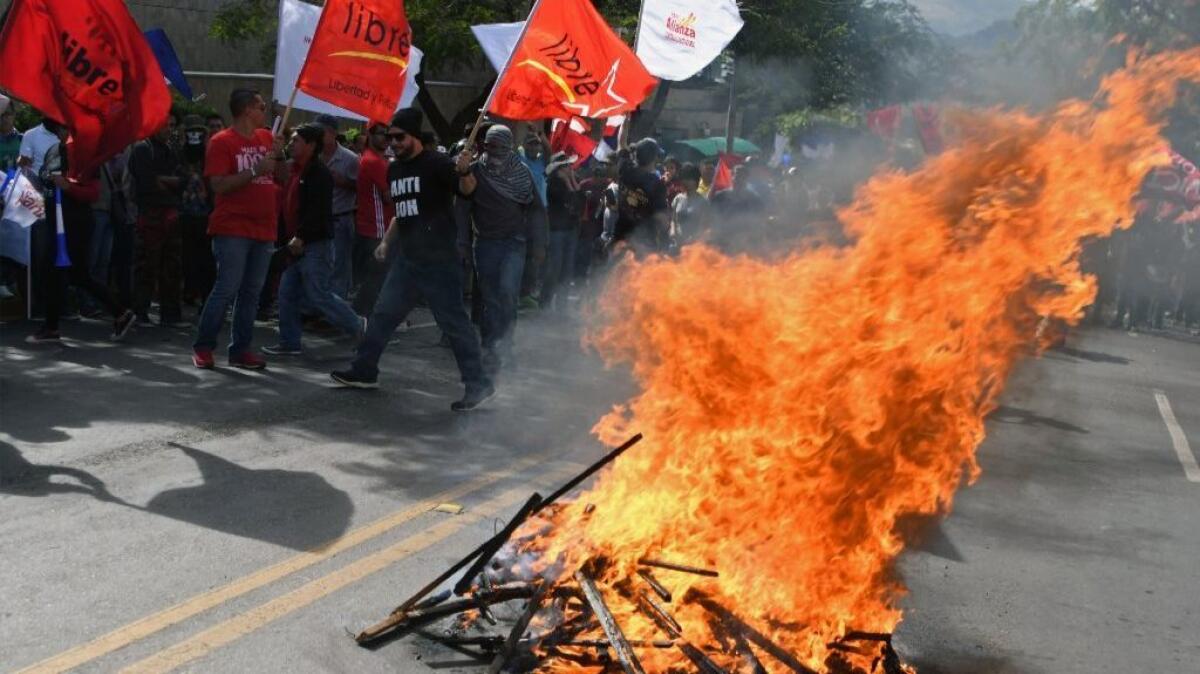Trump administration’s focus on immigration and drug war outweighs democracy concerns in Honduras

- Share via
Reporting from WASHINGTON — In what critics call a weakening of U.S. support for democracy in Latin America, the Trump administration appears to be prioritizing concerns about illegal immigration and drug trafficking from Honduras over the country’s violent and flawed election process.
The administration’s relative silence on last month’s disputed election in Honduras, where a right-wing incumbent and friend of the White House has been accused by opponents of stealing votes, is reminiscent of America’s ideologically driven Cold War policies.
Over the last quarter of a century, Washington sought to fortify democracies across the region and bolster ties overall. When President Obama ended more than half a century of hostility with Cuba, all of Latin America applauded.
The Trump administration is acting more selectively, however, chiefly criticizing leftist leaders.
The State Department has labeled the Nov. 28 decision of Bolivia’s Supreme Court to eliminate term limits as a “step back for democracy,” for example. The move allows leftist President Evo Morales to seek an unprecedented third term.
The White House also has walked back some Obama-era reforms easing trade and travel with Cuba, citing human rights abuses by Havana’s leftist leaders.
But in Honduras, a longtime U.S. strategic ally, the administration has appeared supportive of increasingly autocratic President Juan Orlando Hernandez.
The Central American nation voted for president on Nov. 26. Hernandez was running for reelection after he had stacked courts with supporters who helped him change the Honduran Constitution to allow another term.
Vote counting initially put Salvador Nasralla, a popular TV host, ahead. Then the Supreme Electoral Tribunal, which was in charge of counting votes, mysteriously went silent for more than 24 hours. When it released results again, Nasralla’s lead had dramatically shrunk and Hernandez soon moved to the lead.
Opponents and international monitors cried foul and the impoverished nation of 9 million has been engulfed in tension and violence since. At least 14 people have been killed and dozens injured, mostly by government security forces firing on unarmed demonstrators, according to Amnesty International.
Despite the turmoil, the Trump administration announced Dec. 7 that it was certifying the Honduran government’s compliance with a 12-point program to improve human rights and corruption safeguards. The certification is required to release its share of nearly $650 million in U.S. aid allocated this year for three Central American countries.
Hernandez used the certification to claim U.S. support for his government and, by extension, his candidacy.
“On behalf of the Honduran people, I thank the United States and Secretary of State Rex Tillerson for recognizing our progress,” Hernandez said last week.
His supporters claimed a boost Saturday when Heide Fulton, the top-ranking U.S. diplomat in Honduras, appeared beside an embattled electoral commission official who critics say helped Hernandez commit fraud.
Fulton said she believed a planned partial vote recount would resolve “irregularities” and said the United States is “ready to work with whomever is the winner.”
Most of the opposition is demanding a complete new election.
Tillerson, in certifying Honduras, said the country had taken “effective steps” to counter criminal gangs, drug traffickers and organized crime, as well as protect the rights and lives of political dissidents, journalists and others.
Human rights activists counter that the country’s sky-high homicide rate has fallen but killings of journalists, environmentalists, trade unionists and others remain a serious problem. They also say Hernandez and members of his government are dogged by accusations of looting a public health fund as well as drug trafficking.
Congressional Democrats who specialize in Latin America expressed dismay at the State Department action.
“Certifying [Honduras] in the middle of election crisis is a huge blunder,” Rep. Norma Torres (D-Ontario), who was born in Guatemala, wrote on Twitter, asking if the State Department was “biased, head in the sand, or just incompetent?”
State Department spokeswoman Heather Nauert said U.S. diplomats were “keeping a close eye” on Honduras.
Congress allotted about $650 million in the 2017 budget for Honduras, El Salvador and Guatemala in an effort to cut crime and improve economic conditions there sufficiently to stem immigration. The three countries had to pledge to work to keep their citizens at home.
Hernandez has appeared eager to cooperate, making him a favored, known commodity in Washington.
The Trump administration wants “continuity with Hernandez, who they know will support policies on drug interdiction and undocumented immigration,” said Rosemary Joyce, an anthropologist at UC Berkeley who has studied Honduras for decades.
Hugo Noe Pino, a prominent economist in Honduras who supports Hernandez’s opponent, said Washington has helped legitimize the embattled electoral tribunal, citing Fulton’s appearance, even as international election observers have raised questions of possible fraud.
“The U.S. thinks Hernandez will be the best ally and provide the most stability,” he said.
One reason, he said, is Hernandez has a friend in the White House. President Trump’s chief of staff, John F. Kelly, had led U.S. Southern Command, which has a task force in Honduras.
But Pino said the U.S. strategy could backfire.
“People feel deceived and frustrated,” he said. “If Hernandez is declared winner, it will create more instability” and probably push more illegal immigration northward.
Wilkinson reported from Washington and Linthicum from Mexico City.
For more on international affairs, follow @TracyKWilkinson on Twitter
Twitter: @katelinthicum
More to Read
Sign up for Essential California
The most important California stories and recommendations in your inbox every morning.
You may occasionally receive promotional content from the Los Angeles Times.












